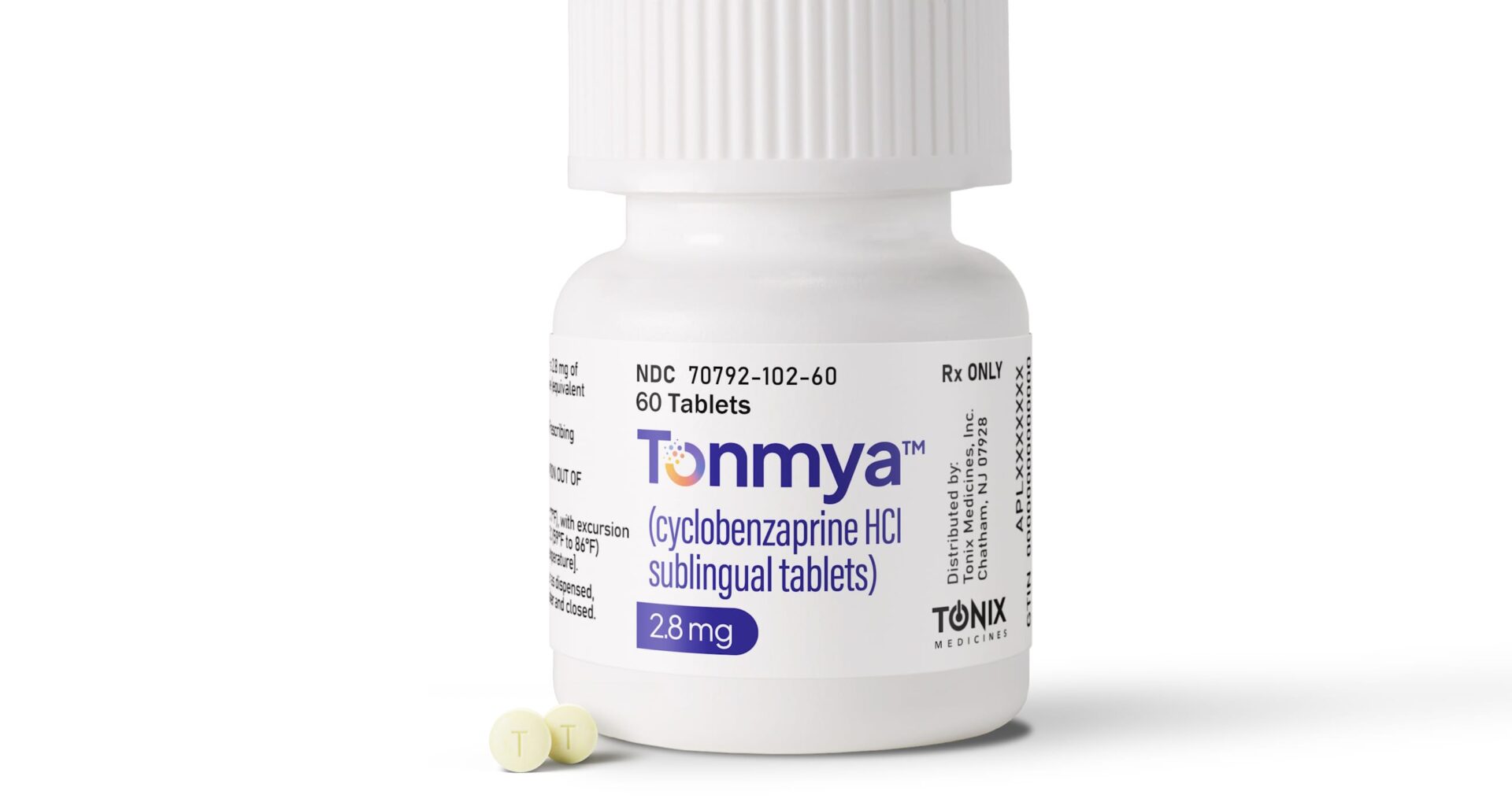The Food and Drug Administration (FDA) has approved Tonmya™ (cyclobenzaprine hydrochloride sublingual tablets) for the treatment of fibromyalgia in adults.
Tonmya is a sublingual formulation of cyclobenzaprine designed to provide rapid transmucosal absorption. While its exact mechanism of action in fibromyalgia is unknown, in pharmacology studies, cyclobenzaprine has demonstrated functional antagonism of 5-HT2A, α1-adrenergic, H1-histaminergic, and M1-muscarinic acetylcholine receptors.
The approval was supported by data from 3 randomized, 2-arm, parallel-group, double-blind, placebo-controlled trials that included a total of 1474 patients aged 18 to 65 years who met the 2016 American College of Rheumatology (ACR) criteria for diagnosis of fibromyalgia. Study participants were randomly assigned to receive bedtime sublingual treatment with either Tonmya 2.8mg nightly for the first 2 weeks, then 5.6mg beginning on the evening of day 15 through week 14 (n=735), or placebo nightly for 14 weeks (n=739).
The primary endpoint in all 3 trials was the change from baseline to week 14 in the weekly average of daily 24-hour recall pain intensity scores, as measured by the 11-point numeric rating scale (NRS). To be enrolled, patients had to have a minimum baseline pain score of 4. Baseline mean weekly averages of daily diary pain scores were similar between the Tonmya and placebo groups.
Findings from Trial 1 (RELIEF; ClinicalTrials.gov Identifier: NCT04172831) and Trial 3 (RESILIENT; ClinicalTrials.gov Identifier: NCT05273749) showed a statistically significant reduction in pain intensity scores with Tonmya compared with placebo (NRS scores compared with placebo least squares [LS] mean difference: Trial 1: -0.4 [95% CI, -0.7, -0.1]; P =.010; Trial 3: -0.7 [95% CI, -1.0, -0.3]; P NCT04508621), no statistically significant difference was observed between Tonmya and placebo.
The most common adverse reactions reported with Tonmya were oral hypoesthesia, oral discomfort, abnormal product taste, somnolence, oral paresthesia, oral pain, fatigue, dry mouth, and aphthous ulcer. The prescribing information also includes warnings and precautions related to embryo-fetal toxicity, serotonin syndrome, tricyclic antidepressant-like adverse reactions, atropine-like adverse reactions, and central nervous system depression.
Tonmya is contraindicated in patients with a hypersensitivity to cyclobenzaprine, with concomitant use of monoamine oxidase inhibitors (MAOI) or within 14 days of discontinuation of an MOAI, during the acute recovery phase of myocardial infarction, and in patients with arrhythmias, heart block or conduction disturbances, or congestive heart failure, and in those with hyperthyroidism.
Tonmya is supplied as a 2.8mg sublingual tablet. The sublingual tablet should be administered at bedtime after brushing teeth and finishing other oral care. Eating or drinking should be avoided for at least 15 minutes after the tablet has completely dissolved and talking should be avoided for at least 5 minutes after administration.
The recommended dosage of Tonmya is 2.8mg once daily at bedtime on days 1 to 14. Starting at day 15, the dose is increased to 5.6mg once daily at bedtime. For geriatric patients and those with mild hepatic impairment, the maximum recommended dosage is 2.8mg once daily at bedtime. Tonmya is not recommended for patients with moderate to severe hepatic impairment. Additionally, pregnancy testing is recommended for females of reproductive age prior to initiating treatment.
The product is expected to be available in the fourth quarter of 2025.
This article originally appeared on MPR
